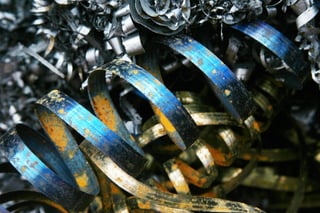
on August 14, 2024 | 4 min. read


If you work with metal, chances are you’ve heard about DFARS and RoHS. But what do they stand for? And what do they have to do with where your metal is melted?
Let’s take a closer look at the role DFARS and RoHS play in the metal supply industry.
Whether or not a metal material’s melt source is significant depends on its final application and/or its final user. One of the most common situations in which melt source matters is when the end product needs to be DFARS compliant.

RoHS, which stands for Restriction of Hazardous Substances, restricts materials known to be hazardous to the environment (including those that pollute landfills). These materials can be dangerous to those who are exposed to them during manufacturing and recycling.
The purpose of RoHS is to reduce the use of hazardous metals. This makes it less likely that they will make it into the recycling mix at harmful levels. Restricted substances with RoHS include cadmium, lead, and mercury. Manufacturers must use safer alternatives when possible, like unleaded soldering for example.
DFARS stands for Defense Federal Acquisition Regulation Supplement and applies to all contractors that provide goods and/or services to the U.S. Department of Defense (DoD).
Metal products used by the DoD must be DFARS compliant, meaning the melt source must be within the United States or from a qualifying country. All NATO countries and a few others — such as Japan, Australia, and Egypt — are qualifying countries.
Failure to comply with DFARS can result in heavy fines and other consequences. So, if you need DFARS-compliant metal products, it’s best to cover your bases and make absolutely sure your metal supplier sources DFARS-compliant material.
Typically, all you need to do to get DFARS or RoHS-compliant metal products is ask for them. If you need domestically melted, DFARS-compliant, and RoHS-compliant metal, it’s essential to inform your metal vendor up front. That way, they can give you an accurate quote and lead time for your order and ensure you’ll get the material your project requires. Some metal vendors and service centers are easier to work with because they already buy compliant metals.
Here at Mead Metals, meeting RoHS and DFARS compliance standards is our standard. We prefer to purchase domestically sourced metals whenever feasible. If we can’t buy domestically, then we buy from a DFARS-compliant country. The only exception is in cases where a metal cannot be mined in an approved country.
As a matter of principle, we purchase materials that meet these compliance standards because they meet our own quality standards. We’ve built solid and long-lasting relationships with the mills from which we source our materials, and our customers can benefit from the quality materials and the clear documentation that results from those relationships.
Knowing a metal’s melt source is incredibly important for many applications and end products; for others, it might not matter much. But we know that when a metal’s melt source matters, it matters a lot, and we are committed to ensuring you get what you need.
When sourcing metal material, you don’t want to worry about noncompliance or messy paperwork. To guarantee you’re getting the highest quality standards and clear documentation to back up your product, get a free quote from Mead Metals today.
